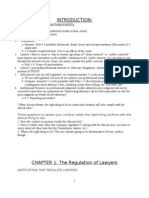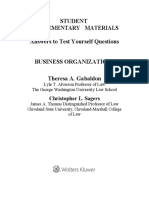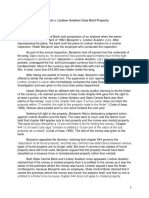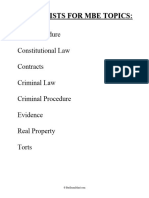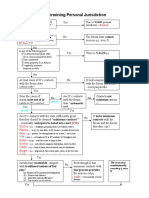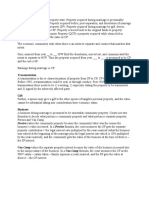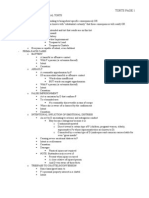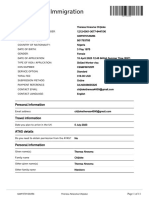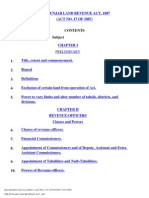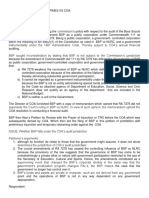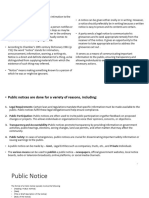K BarExamS10
K BarExamS10
Uploaded by
zzsquadronCopyright:
Available Formats
K BarExamS10
K BarExamS10
Uploaded by
zzsquadronOriginal Title
Copyright
Available Formats
Share this document
Did you find this document useful?
Is this content inappropriate?
Copyright:
Available Formats
K BarExamS10
K BarExamS10
Uploaded by
zzsquadronCopyright:
Available Formats
K.
Topics Covered on the Bar Exam
The Multistate Bar Exam (MBE) is a 200-question multiple choice exam administered in every
state except Louisiana, Washington, and the Territory of Puerto Rico. The topics covered on the
MBE are listed in the left-hand column and the Temple Law School courses in which those
topics are covered are listed in the right-hand column. [Note: Subjects that may appear on a bar
exam are discussed in many courses. The list below includes only those courses which devote
substantial attention to subject areas which are specified as being covered on the MBE.]
MBE Topics Temple Courses
Constitutional Law (50% based on Judicial Constitutional Law
Review, Separation of Powers & the Federal Political & Civil Rights
System; 50% based on Individual Rights) [Particular MBE constitutional law topics
are also covered in other courses, including
Federal Courts & Jurisdiction, Conflict of
Laws, Administrative Law, Equal
Protection, First Amendment, Issues and
Trends in Civil Rights Law, Religious
Rights, State & Local Government Law,
Legislation]
Contracts (25% based on UCC Article 2) Contracts
Advanced Contracts
Sales
Electronic Commerce
Criminal Law and Procedure (50% based on Criminal Law I
constitutional protections of accused Criminal Procedure I
persons) [Particular MBE criminal law topics are
covered in other courses, including Criminal
Law II, Criminal Procedure II, Federal
Criminal Law, White Collar Crime, Death
Penalty]
Evidence Evidence
Real Property (based 20% each on Titles, Property
Ownership [including Landlord/Tenant], Real Estate Transactions
Rights in Land, Real Property Contracts, and [Particular MBE property law topics are
Mortgages) covered in other courses, including Trusts &
Estates and Land Use Planning.]
Torts (50% based on Negligence; Torts
50% based on Intentional Torts, Strict [Particular MBE torts topics are also
Liability, Products Liability and “other covered in other courses, including Drug
torts”) Products Liability, Medical Malpractice]
Each state also has another portion of the bar exam, usually in an essay format. The topics
covered on that portion of the state bar exams most frequently taken by Temple Law School
graduates are listed below.
The Pennsylvania essay exam topics are: Business Organizations (including corporations,
partnerships, limited liability companies and professional corporations); Civil Procedure (PA and
federal); Criminal Law (including related PA and federal constitutional issues and PA DUI law);
Conflict of Laws; Contracts; Employment Discrimination (limited to Title VII, ADA and
ADEA); Evidence (PA and federal); Family Law; Federal Constitutional Law; Federal Personal
Income Tax; Professional Responsibility; Real Property; Torts; Sales (UCC Article II); and,
Wills, Trusts and Decedents’ Estates (including related fiduciary responsibilities).
Another component of the Pennsylvania Bar Exam is a 90-minute Performance Test developed
by the Board of Law Examiners. This test is designed to evaluate an applicant’s ability to use
fundamental lawyering skills in situations that are comparable to those encountered in the
practice of law, with an emphasis on ability to complete certain tasks that a beginning attorney
should be able to accomplish.(Pennsylvania is unusual in having its own performance test; most
other states use the Multi-State Performance Test (MPT) developed by National Conference of
Bar Examiners.)
New Jersey bases the essay portion of its bar exam on the six MBE subjects and Civil Procedure.
Such essay questions may be framed in the context of fact situations involving and interrelated
with: Agency, Conflicts of Law, Corporations, Equity, Family Law, Partnership, UCC Articles 2
(Sales), 3 (Commercial Paper), and 9 (Secured Transactions), Wills, Trusts and Estates, Zoning
and Planning, and Disciplinary Rules.
In addition to the MBE, the New York portion of the bar exam consists of five essay questions,
the MPT, and 50 multiple choice questions. This portion of the exam tests all six MBE subjects,
as well as the following topics: Business Relationships, Conflict of Laws, New York
Constitutional Law, Criminal Procedure, Family Law, Remedies, New York and Federal Civil
Jurisdiction and Procedure, Statutory No-Fault Insurance Provisions, Professional Responsibility,
Trusts, Wills, Estates, and UCC Articles 2, 3, and 9. Except for questions involving federal law,
the New York essay and multiple choice questions are based on the law of New York.
Pennsylvania and New York require applicants to take the Multistate Professional Responsibility
Exam (MPRE). New Jersey does not require the MPRE if the applicant earned a “C” or better in
Professional Responsibility during law school.
Please be aware that these are, to the best of our knowledge, the formats for the bar exams in
2010 in the states listed above. Each year, many states modify their exams in some way. If we
learn of changes in the bar exams in Pennsylvania, New Jersey or New York, we will attempt to
announce those changes to our students. However, you should not rely exclusively on this
memo, or other Law School announcements, for comprehensive information on the bar
examination(s) you expect to take. For more information on the topics covered in the states
listed or in other states, you should contact the bar examiners in the states in which you intend to
practice. BAR/BRI, a bar examination review provider, maintains brief information on its web
site (www.barbrigroup.com) on the bar examination requirements for all 50 states and the
District of Columbia.
You might also like
- English For Law - Practice QuestionsDocument28 pagesEnglish For Law - Practice QuestionsRaquel AlvesNo ratings yet
- Midterm PracticeDocument18 pagesMidterm PracticeJulia MNo ratings yet
- Mpre Ope 1Document61 pagesMpre Ope 1Julie DnqNo ratings yet
- Anti-SLAPP Law Modernized: The Uniform Public Expression Protection ActFrom EverandAnti-SLAPP Law Modernized: The Uniform Public Expression Protection ActNo ratings yet
- Outline Criminal Procedure Professor JonesDocument82 pagesOutline Criminal Procedure Professor JonesRick GarciaNo ratings yet
- Mpre Ope 1Document62 pagesMpre Ope 1Julie DnqNo ratings yet
- Evidence I Mentor OutlineDocument8 pagesEvidence I Mentor OutlineLALANo ratings yet
- Torts LectureDocument25 pagesTorts LectureAlex Faris50% (2)
- MBE BN ContractsDocument64 pagesMBE BN ContractsZviagin & CoNo ratings yet
- PR OutlineDocument68 pagesPR OutlineKevin PrideNo ratings yet
- Professional Responsibility - Morgan - Spring 2006Document33 pagesProfessional Responsibility - Morgan - Spring 2006tyuuNo ratings yet
- Exam Outline - ArcaroDocument43 pagesExam Outline - Arcarojuniper19No ratings yet
- Billing Information For New ClientsDocument6 pagesBilling Information For New ClientsBantug De Ocampo JinkeeNo ratings yet
- Law School Survival Guide (Volume II of II) - Outlines and Case Summaries for Evidence, Constitutional Law, Criminal Law, Constitutional Criminal Procedure: Law School Survival GuidesFrom EverandLaw School Survival Guide (Volume II of II) - Outlines and Case Summaries for Evidence, Constitutional Law, Criminal Law, Constitutional Criminal Procedure: Law School Survival GuidesNo ratings yet
- Rigos Bar Review Series "Uniform" Multistate Essay Exam (Mee) Review Federal Civil Procedure Magic Memory OutlinesDocument8 pagesRigos Bar Review Series "Uniform" Multistate Essay Exam (Mee) Review Federal Civil Procedure Magic Memory Outlinessomeguy813No ratings yet
- Writing SkillsDocument10 pagesWriting Skillsca1robby15No ratings yet
- PR Mentor OutlineDocument15 pagesPR Mentor OutlineLALANo ratings yet
- CharacterDocument15 pagesCharacterZarah TrinhNo ratings yet
- MBEQuestions1998 PDFDocument103 pagesMBEQuestions1998 PDFMarco FortadesNo ratings yet
- Tort Mbe AnswersDocument10 pagesTort Mbe AnswersStacy MustangNo ratings yet
- Student Supplementary Materials Answers To Test Yourself QuestionsDocument118 pagesStudent Supplementary Materials Answers To Test Yourself Questionsmilk teaNo ratings yet
- Property OutlineDocument20 pagesProperty OutlineEugene PevznerNo ratings yet
- CIVPRO Essay Template / Add or Modify To Individual StudyDocument20 pagesCIVPRO Essay Template / Add or Modify To Individual Studyfun321goNo ratings yet
- Pieper Bar ReviewDocument150 pagesPieper Bar ReviewJoanne Schioppi0% (2)
- Constituional LawDocument8 pagesConstituional LawQuiana MontgomeryNo ratings yet
- MPT ChecklistDocument2 pagesMPT ChecklistMerve OzcanNo ratings yet
- CIV PRO BARBRI NOTES EditedDocument16 pagesCIV PRO BARBRI NOTES EditedTOny AwadallaNo ratings yet
- Benjamin v. Lindner Aviation Case StudyDocument16 pagesBenjamin v. Lindner Aviation Case StudyMissy MeyerNo ratings yet
- Essay Writing WorkshopDocument14 pagesEssay Writing Workshopgreengrape3No ratings yet
- Outline ShortDocument18 pagesOutline ShortksskelsoNo ratings yet
- BarDocument337 pagesBarMrZee27No ratings yet
- MBE ChecklistsDocument17 pagesMBE ChecklistsStacy OliveiraNo ratings yet
- PJ and DiversityDocument2 pagesPJ and DiversityjuicykeyNo ratings yet
- Crim Law BarDocument13 pagesCrim Law BarKim BoSliceNo ratings yet
- MPRE OutlineDocument41 pagesMPRE Outlinekyw123No ratings yet
- Parties. ALIENAGE If One Party Is Citizen of Foreign State, Alienage Jdx. Satisfied, Except WhenDocument2 pagesParties. ALIENAGE If One Party Is Citizen of Foreign State, Alienage Jdx. Satisfied, Except WhenCory BakerNo ratings yet
- Community Property TemplateDocument3 pagesCommunity Property TemplateHaifa NeshNo ratings yet
- Crim Law OutlineDocument9 pagesCrim Law OutlineEmma Trawick BradleyNo ratings yet
- Crim Law Outline For California BarDocument9 pagesCrim Law Outline For California BarchrisngoxNo ratings yet
- MPTDocument2 pagesMPTKim Orven KhoNo ratings yet
- Evidence Questions For FinalDocument5 pagesEvidence Questions For FinalNaderNo ratings yet
- This Type of Evidence Is Sometimes Referred To As "MIMIC" Evidence (Motive, Intent, Absence of Mistake, Identity, or Common Plan)Document4 pagesThis Type of Evidence Is Sometimes Referred To As "MIMIC" Evidence (Motive, Intent, Absence of Mistake, Identity, or Common Plan)Camille Walker100% (1)
- Professional Responsibility Gillers Fall 2009Document32 pagesProfessional Responsibility Gillers Fall 2009gtownhopefu2013100% (2)
- Barmax Mpre Study Guide: Xii. Judicial Conduct (2% To 8%)Document7 pagesBarmax Mpre Study Guide: Xii. Judicial Conduct (2% To 8%)TestMaxIncNo ratings yet
- Criminal Mbe AnswersDocument10 pagesCriminal Mbe AnswersStacy MustangNo ratings yet
- Civ Pro Outline BarbriDocument22 pagesCiv Pro Outline BarbriEs AzcuetaNo ratings yet
- conversion/tmp/activity - Task - Scratch/541632757.docx Last Saved: 0/0/0000 0:00:00 AMDocument147 pagesconversion/tmp/activity - Task - Scratch/541632757.docx Last Saved: 0/0/0000 0:00:00 AMAndrew Ferguson100% (1)
- Constitutional Law Bar Exam PrepDocument21 pagesConstitutional Law Bar Exam Prepbrpatel0101988100% (1)
- Tests and FactorsDocument17 pagesTests and FactorsBrianStefanovicNo ratings yet
- QuestionsDocument144 pagesQuestionsNoah Jacoby LewisNo ratings yet
- Class 3: MC Practice Questions: Torts: To: de Cardenas, Gaston L.Document1 pageClass 3: MC Practice Questions: Torts: To: de Cardenas, Gaston L.Gaston Luis De Cardenas0% (1)
- Denno Crim Law Exams Part 2Document83 pagesDenno Crim Law Exams Part 2Jay SmithNo ratings yet
- Conviser TortsOutlineDocument9 pagesConviser TortsOutlinealexoganesyanNo ratings yet
- PMBR Contracts I PDFDocument52 pagesPMBR Contracts I PDFno contractNo ratings yet
- Barack Constitutional LawDocument29 pagesBarack Constitutional LawStacy MustangNo ratings yet
- Civil Procedure Mentor OutlineDocument7 pagesCivil Procedure Mentor OutlineLALANo ratings yet
- Agency OverviewDocument14 pagesAgency OverviewmaddolaxNo ratings yet
- MBE Subject Matter OutlineDocument8 pagesMBE Subject Matter OutlineSalam TekbaliNo ratings yet
- Fall 2017 Practice Exam (Professional Responsibility - Schrag)Document9 pagesFall 2017 Practice Exam (Professional Responsibility - Schrag)MarissaNo ratings yet
- MBE - TortsDocument16 pagesMBE - TortsMichael FNo ratings yet
- 1st Semester Real Property Student Class OutlineDocument43 pages1st Semester Real Property Student Class OutlineLALA100% (1)
- Plaintiffs,: in The United States District Court Southern District of Texas Galveston DivisionDocument7 pagesPlaintiffs,: in The United States District Court Southern District of Texas Galveston DivisionDavid FoleyNo ratings yet
- Team Sual Corp. v. CIR G.R. No. 201225 April 18, 2018Document6 pagesTeam Sual Corp. v. CIR G.R. No. 201225 April 18, 2018William SantosNo ratings yet
- Affidavit by Student or ParentDocument2 pagesAffidavit by Student or Parentgovind890jhaNo ratings yet
- Dyuthi T1260Document626 pagesDyuthi T1260Shayan ZafarNo ratings yet
- Landbank vs. CA, G.R. No. 118712Document3 pagesLandbank vs. CA, G.R. No. 118712Aderose Salazar100% (1)
- The Nature and Functions of The StateDocument15 pagesThe Nature and Functions of The StatePragna Sree MNo ratings yet
- Protecting Americans in The Idf ActDocument3 pagesProtecting Americans in The Idf ActJamie WhiteNo ratings yet
- Construction Contract Agreement: PartiesDocument4 pagesConstruction Contract Agreement: PartiesRaj Narayan VermaNo ratings yet
- Samahang Manggagawa, Et Al. vs. NLRC, 295 SCRA 171Document7 pagesSamahang Manggagawa, Et Al. vs. NLRC, 295 SCRA 171JoeyBoyCruzNo ratings yet
- UK Visas & Immigration: Personal InformationDocument11 pagesUK Visas & Immigration: Personal InformationYung BtcNo ratings yet
- Astute Electronics Non Disclosure - Confidentiality Agreement NDA-SignedDocument5 pagesAstute Electronics Non Disclosure - Confidentiality Agreement NDA-SignedMike NovakNo ratings yet
- Savenda Management Services Limited V Stanbic Bank Zambia Limited PDFDocument8 pagesSavenda Management Services Limited V Stanbic Bank Zambia Limited PDFDoris TembweNo ratings yet
- L. S. Agreement - Maria Katherine G. IkedaDocument2 pagesL. S. Agreement - Maria Katherine G. Ikedamark villamorNo ratings yet
- Temporary Suspension of Operations Form: For Bingo, Electronic and Poker GamesDocument2 pagesTemporary Suspension of Operations Form: For Bingo, Electronic and Poker GamesSunshine EnriquezNo ratings yet
- GR No. 224112 - Republic Vs Bloomberry ResortsDocument9 pagesGR No. 224112 - Republic Vs Bloomberry ResortsAlfred Robert BabasoroNo ratings yet
- Punjab Land Revenue ActDocument90 pagesPunjab Land Revenue ActMatthew GomezNo ratings yet
- Reference and Revision 26th.Document9 pagesReference and Revision 26th.Zerobalance DhanushNo ratings yet
- BSP Vs COADocument3 pagesBSP Vs COAElla B.No ratings yet
- Legal Education A Need To Reform Role of Regulatory BodiesDocument3 pagesLegal Education A Need To Reform Role of Regulatory BodiesRoshni SinghNo ratings yet
- Public NoticeDocument4 pagesPublic Noticesakkarvirani1No ratings yet
- MP Fund RTI ApplicationDocument3 pagesMP Fund RTI ApplicationUmesh TailorNo ratings yet
- 2b Morfe V Mutuc Ed PDF FreeDocument5 pages2b Morfe V Mutuc Ed PDF Freesoojung jungNo ratings yet
- ACT NO. 3983 Protecting Wild Flowers in The Philippine IslandsDocument1 pageACT NO. 3983 Protecting Wild Flowers in The Philippine IslandsE.F.FNo ratings yet
- Civic Education Notes 10-12-1-2Document256 pagesCivic Education Notes 10-12-1-2odiousmudidiodiousNo ratings yet
- Oposa vs. Factoran G.R. No. 101083Document3 pagesOposa vs. Factoran G.R. No. 101083Christian Nero BeltranNo ratings yet
- Admissibility Guide ENG NOUDocument85 pagesAdmissibility Guide ENG NOUIoana RoşcaNo ratings yet
- Junior Computer Operator in PPSCDocument2 pagesJunior Computer Operator in PPSCppsc3400No ratings yet
- 4-Polity by DR Sidharth Arora-4 DPSPDocument151 pages4-Polity by DR Sidharth Arora-4 DPSPNishant SinghNo ratings yet
- Interpretation of Statutes Case LawDocument2 pagesInterpretation of Statutes Case LawSaleha WaqarNo ratings yet









